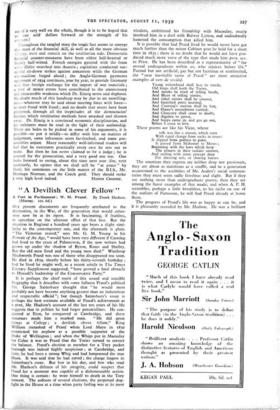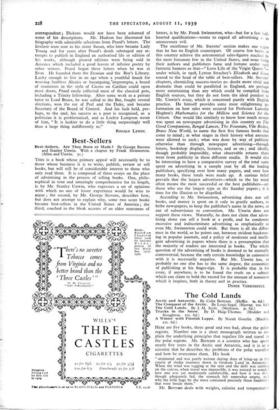"A Devilish Clever Fellow"
A Poet in Parliament ; W. M. Praed. By Derek Hudson. (Murray. ns. 6c1.)
OUR present discontents are frequently attributed to the decimation, in the War, of the generation that would other- wise now be at its ripest. It is fascinating, if fruitless, to speculate on the ultimate effect of that loss. But the situation in England a hundred years ago bears a slight simi- larity to the contemporary one, and the aftermath is plain. "The Victorian record," says Mr. G. M. Young in his Portrait of An Age," would have been very different if Canning had lived to the years of Palmerston, if the new writers had grown up under the shadow of Byron, Keats and Shelley. But the old men lived and the young men died." Winthrop Mackworth Praed was one of those who disappeared too soon. He died in 1839, shortly before his thirty-seventh birthday ; had he lived he might well, as a recent article in The Times Literary Supplement suggested, "have proved a fatal obstacle to Disraeli's leadership of the Conservative Party."
It is perhaps the chief merit of this sound and sensible biography that it describes with some fullness Praed's political life. George Saintsbury thought that "he would most probably not have become anything gt eater than an industrious and respectable official"; but though Saintsbury's essay is perhaps the best estimate available of Praed's achievement as a poet, Mr. Hudson's account of the last ten years of his life suggests that in politics he had larger potentialities. He con- quered at Eton, he conquered at Cambridge, and these successes made him a marked man. "He did great things at College ; a devilish clever fellow," King William remarked of Praed when Lord Mayo in 1830 mentioned his nephew as a possible supporter of the Duke of Wellington ; and when the Whigs put in Macaulay for Caine it was to Praed that the Tories turned to correct the balance. Praed's election as member for a Tory pocket borough was indeed highly suspicious ; at Cambridge, and later, he had been a strong Whig and had lampooned the true Blues. It was said that he had ratted ; the charge lingers in Saintsbury's essay. But few in his day, and few who read Mr. Hudson's defence of his integrity, could suspect that Praed for a moment was capable of a dishonourable action. One thing is certain: he wore himself to death in the Tory interest. The ardours of several elections, the perpetual dog- fight in the House at a time when party feeling was at its most virulent, embittered his friendship with Macaulay, nearly involved him in a duel with Bulvver Lytton, and undoubtedly hastened the consumption that killed him.
It is possible that had Praed lived he would never have got much further than the minor Cabinet post he held for a short time in 1835; there is no doubt that he would not have pro- duced much more verse of the type that made him prox. ace. to Prior. He has been described as a representative of "the eternal undergraduate within us, who rejoices before life." Formal but not artificial, gay but not facetious or sentimental, the "neat inevitable turns of Praed" are most attractive examples of vers de societe.
Young widowhood shall loae its weeds, Old kings shall loath the Tories, And monks be tired of telling beads, And Blues of telling stories;
And titled suitors shall be crossed, And famished poets married, And Canning's motion shall be lost, And Home's amendment carried; And Chancery shall cease to doubt, And Algebra to prove, And hoops come in, and gas go out, Before I cease to love.
These poems are like his Vicar, whose talk was like a stream, which runs With rapid change from rocks to roses:
It slipped from politics to puns,
It passed from Mahomet to Moses ; Beginning with the laws which keep The planets in their radiant courses,
And ending with some precept deep
For dressing eels, or shoeing horses.
The emotions they express are neither deep nor passionate,
they are about as nutritious as a souffle, and to a generation accustomed to the acerbities of Mr. Auden's social commen- taries they must seem sadly frivolous and slight. But if they are nothing more than undergraduate poetry, then they are among the finest examples of that mode; and when A. P. H.
scrambles, perhaps a little breathless, to his niche on one of the outliers of Parnassus, he will find Praed already at home there.
The progress of Praed's life was as happy as can be, and it is pleasantly recorded by Mr. Hudson. He was a brilliant
correspondent ; Dickens would not have been ashamed of some of his descriptions. Mr. Hudson has illustrated his biography with admirable selections from Praed's letters. The liveliest were sent to his sister Susan, who later became Lady Young and for years after Praed's death sabotaged any at- tempts to publish in England an authorised life or edition of his works, although pirated editions were being sold in America which included a good leaven of inferior poetry by other writers. Praed began these letters when he was at Eton. He founded there the Etonian and the Boy's Library. Lucky enough to live in an age when a youthful knack for weaving faultless Alcaics or haranguing,'Impromptu, a board of examiners in th,t style of Cicero on Catiline could open most doors, Praed easily collected most of the classical pots, including a Trinity fellowship. After some wcrk as -a private tutor to Lord Bruce, he was called to the Bar, fought several elections, won the ear of Peel and the Duke, and became Secretary of the Board of Control. And his luck held, per- haps, to the end; his success as a poet is recognised, as a politician it is problematical, and as Locker Lampson wrote of him, "It is luckier to do a little thing surpassingly well than a large thing indifferently so."
RONALD LEWIN.









































 Previous page
Previous page